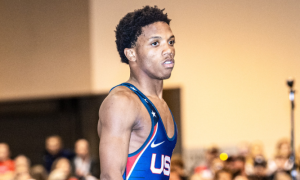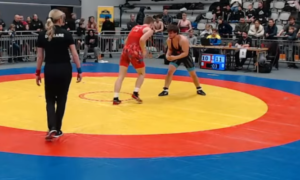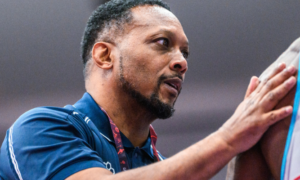The Ohio Regional Training Center, located at the Ohio State University, has itself a new World Champion on staff.
United States Greco-Roman legend Dennis Hall is assuming the role of Greco-Roman coach at the Ohio RTC, effective immediately. But he won’t be breaking east for Columbus just yet; for the time being, Hall is set to make week-long appearances in Columbus while he continues to oversee his home club, World Gold Wrestling in Stevens Point, Wisconsin.
The move, which had originally been put in motion this past summer, sees Hall join an Ohio RTC coaching staff that includes two-time freestyle World bronze Tervel Dlagnev, two-time NCAA Division I National Champion J Jaggers, four-time Division I All-American Bo Jordan, and of course, tOSU head coach Tom Ryan.
“I’m glad to be part of this staff and I look forward to working with all of the coaches,” Hall said. “They have a vision to build a Greco hub for the United States, which is grossly needed. Plus, the new facility they have is going to be the best in the country, probably the best in the world, bar-none. So, I’m pretty excited about getting to work with these high-level coaches and athletes.”
Hall’s presence at the Ohio RTC first began in the spring. He had spent a week in Columbus assisting 2018 Junior World Team member Brady Koontz (55 kg), Dylan Koontz (55 kg), and Fritz Schierl (77 kg), three of Hall’s former age-group pupils, as they prepared for their respective Trials events. While on-site, the three-time Olympian also worked with several other Ohio RTC athletes on core strength training using Hall’s SPIKE system that was eventually implemented by the USA Senior Greco-Roman World Team throughout the summer. Tomasello later spent a week in Wisconsin with Hall in effort to receive individual SPIKE training as he makes his way towards a full recovery from knee surgery.
“I’ve been out to Ohio twice now and have worked with Tomasello, who is a freestyle wrestler, on how to hand-fight better,” explained Hall. “That’s part of my job now, to help out the program in any way that I can, and for either style. I’ve gotten some individual time in with guys already, which is nice because I’ve been able to get to know them, too.”
Thanks to the enormous success of the collegiate program in concert with its World-level freestyle stars, the Ohio RTC has become one of the most high-profile wrestling facilities in the country. But also like most other collegiate RTC’s, Greco-Roman did not seem to be part of the picture. That is something Ryan wants to change and is working to do so, as evidenced not only by Hall’s inclusion, but also by the current Ohio State roster.
“Ohio State has a heart for Greco-Roman,” Ryan declared. “We have a few Greco athletes now and the objective is to continue to bring in more wrestlers who know how to fight and compete. Greco athletes tend to have those attributes, and that’s why we’d like to include more of them in our program.
“Take Brady (Koontz), he is going to be in a dogfight for the spot at 125 pounds in our room but he has made a World Team,” continued Ryan, “and so he understands what it’s like to compete at a high level. It’s the same with Fritz (Schierl), he made it to the finals of the U23 Trials. These are the type of wrestlers who can contribute to the Ohio State program and also achieve great things at the World level, and we want to help them do that.”
Veering back to Hall, one of his tasks will obviously involve bringing Ohio RTC athletes who are entering national Greco tournaments up to speed. In what seems like a never-ending conversation about domestic Greco-Roman development and its being stymied by the folkstyle system, the perception is that once post-grads are ready to compete internationally, the learning curve has often become too steep.
While it is true that American collegiate wrestlers do face different challenges crossing over than generations past (save for Adam Coon in Budapest), Hall believes they still represent a viable mold to work with and that the adjustments necessary aren’t diametrically opposed to what conventional Greco wisdom dictates. Collegians by and large have the baseline; with positional refinement, hardened hand-fighting skills, and a greater understanding of technique, a new influx of competitors who can gain ground domestically have a chance to boost the entire US National program.
“First of all, one thing being a part of the RTC does is that it brings in depth for the US Greco system,” Hall said. “Even if these guys do not make a Team, they’re going to be competitors and will perform at the highest level. They are not afraid to compete, a lot of them are national champions, All-Americans, and national qualifiers at Division I. The guys know how to compete, so to me, it is about getting a higher level of competition in the United States so that guys have to train harder to win that World medal.
“One of our country’s best assets is the level change, penetration. How many level changes do we see from athletes in the US? The level change opens up body attacks and all of the throws. All of these guys (at the Ohio RTC) already have a great level change down. Once we give them the techniques, they are going to be scary.”
*Dennis Hall is also the co-host of The Five Point Move Podcast and will discuss more about his involvement with the Ohio RTC coming up in Episode 21, set to be released this week.
CLICK HERE TO DONATE TO THE USA GRECO-ROMAN PROGRAM
SUBSCRIBE TO THE FIVE POINT MOVE PODCAST
iTunes | Stitcher | Spreaker | Google Play Music | RSS



















